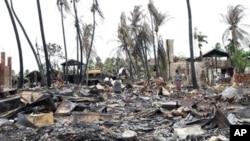Burmese officials have told a visiting U.N. human rights expert that security forces exercised "maximum restraint" in responding to deadly riots between Buddhists and Muslim Rohingyas in the country's west last month.
In a statement Monday, the Burmese foreign ministry said it "strongly rejects" accusations that authorities engaged in abuses and excessive force to end the violence that killed more than 70 people in Rakhine state. Burmese officials discussed the situation in Rakhine with U.N. expert Tomas Ojea Quintana on Monday.
Last week, U.N. High Commissioner for Human Rights Navi Pillay said the Burmese government's response to the communal violence "may have turned into a crackdown targeting Muslims, in particular members of the Rohingya community."
Earlier this month, London-based rights group Amnesty International also said it has "credible reports" of Rakhine Buddhists and security forces targeting Rohingyas and other Rakhine Muslims with "physical abuse, rape, destruction of property and unlawful killings."
The Burmese foreign ministry said it "totally rejects" what it calls "attempts by some quarters to politicize and internationalize this situation as a religious issue." It said Burma is a multi-religious country where people of different faiths have lived together in peace for centuries.
Quintana said he plans to visit Rakhine on Tuesday.
The UNHCR has said last month's riots displaced about 80,000 people, with most living in camps or with host families in nearby villages. The Burmese government has said most of the refugees are Muslims.
The riots began after the rape and murder of a local Buddhist woman on May 28 and a subsequent revenge attack by Buddhists who killed 10 Muslims on June 3. Burma's government refuses to recognize the country's estimated 800,000 Rohingyas as an ethnic group and many Burmese consider them to be illegal immigrants from Bangladesh.
Also Monday, Quintana visited Rangoon's Insein Prison to meet with political prisoners, including Wai Phyo Aung, who is suffering from cancer. The detainee's wife Ma Htay Htay attended the meeting and said the U.N. expert promised to help.
“He said he has been calling for the release [of political prisoners] along with [the] international community, and told us that he will push further for the release of my husband as he is terminally ill," she said. "He also pledges that he will try to let the international community know how my husband’s health -- liver cancer and paralysis -- has deteriorated from a lack of proper medical care.”
Burma has released hundreds of political prisoners since last year, when a civilian government with close ties to the military came to power, ending decades of harsh military rule. But some rights groups say hundreds of prisoners-of-conscience remain in government detention and should be freed.
- VOA Burmese Service's Aye Aye Mar contributed to this report.
In a statement Monday, the Burmese foreign ministry said it "strongly rejects" accusations that authorities engaged in abuses and excessive force to end the violence that killed more than 70 people in Rakhine state. Burmese officials discussed the situation in Rakhine with U.N. expert Tomas Ojea Quintana on Monday.
Last week, U.N. High Commissioner for Human Rights Navi Pillay said the Burmese government's response to the communal violence "may have turned into a crackdown targeting Muslims, in particular members of the Rohingya community."
Earlier this month, London-based rights group Amnesty International also said it has "credible reports" of Rakhine Buddhists and security forces targeting Rohingyas and other Rakhine Muslims with "physical abuse, rape, destruction of property and unlawful killings."
The Burmese foreign ministry said it "totally rejects" what it calls "attempts by some quarters to politicize and internationalize this situation as a religious issue." It said Burma is a multi-religious country where people of different faiths have lived together in peace for centuries.
Quintana said he plans to visit Rakhine on Tuesday.
The UNHCR has said last month's riots displaced about 80,000 people, with most living in camps or with host families in nearby villages. The Burmese government has said most of the refugees are Muslims.
The riots began after the rape and murder of a local Buddhist woman on May 28 and a subsequent revenge attack by Buddhists who killed 10 Muslims on June 3. Burma's government refuses to recognize the country's estimated 800,000 Rohingyas as an ethnic group and many Burmese consider them to be illegal immigrants from Bangladesh.
Also Monday, Quintana visited Rangoon's Insein Prison to meet with political prisoners, including Wai Phyo Aung, who is suffering from cancer. The detainee's wife Ma Htay Htay attended the meeting and said the U.N. expert promised to help.
“He said he has been calling for the release [of political prisoners] along with [the] international community, and told us that he will push further for the release of my husband as he is terminally ill," she said. "He also pledges that he will try to let the international community know how my husband’s health -- liver cancer and paralysis -- has deteriorated from a lack of proper medical care.”
Burma has released hundreds of political prisoners since last year, when a civilian government with close ties to the military came to power, ending decades of harsh military rule. But some rights groups say hundreds of prisoners-of-conscience remain in government detention and should be freed.
- VOA Burmese Service's Aye Aye Mar contributed to this report.




